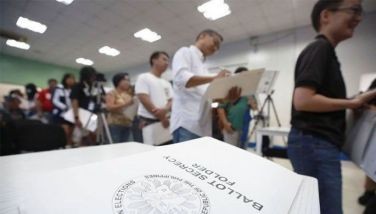No substantive progress for Truth Commission
MANILA, Philippines - The chairman of the Philippine Truth Commission said yesterday the fact-finding body has not moved further on the substantive aspect of its work as it awaits the Supreme Court’s (SC) ruling on the constitutionality of the executive order creating the commission.
“As we have announced, the substantive aspect will begin after the SC decides on the constitutionality of Executive Order No. 1,” chairman and former chief justice Hilario Davide Jr. told The STAR.
Davide said the Commission’s desk at the Philippine International Convention Center (PICC) has received new complaints.
As of last month, the fact-finding body received at least 23 cases, including alleged irregularities involving former President Gloria Macapagal-Arroyo.
“We are still evaluating. These are cases brought before us,” he said.
Davide, on the other hand, was mum when asked about doubts expressed during a forum at the Ateneo School of Law about the Truth Commission’s effectiveness and adherence to international standards.
“I am not aware (of the comments) because I did not attend,” he said.
Davide stressed that the body would be ready for its substantive work “if by the grace of God the SC shall decide in favor of the constitutionality of Executive Order No. 1” promulgated by President Aquino.
Also in the Commission are retired SC justices Flerida Ruth Romero and Romeo Callejo Sr., Ateneo Law professors Carlos Medina Jr. and Menardo Guevarra.
Davide and Medina said the Commission started reviewing a tentative list of 23 cases involving massive graft and corruption which could be investigated by the body.
The cases include the NBN-ZTE deal, “Hello, Garci” scandal and alleged irregularities committed during the Arroyo administration covering the period 2001 to 2010.
The officials, however, declined to discuss the other cases being reviewed by the commission.
The commission assured that Arroyo, government officials and private individuals who will be subject of the investigation will be treated fairly.
Meantime, the American think tank and support group Project on Justice in Times of Transition (PJTT) urged the Truth Commission to focus on human rights cases and also look into corruption in other administrations apart from the Arroyo regime.
During a recent workshop held at the Ateneo Graduate School of Law, PJTT representatives Wendy Luers and Adam Levy, who facilitated the discussions, said the nature of the Truth Commission created by the new administration differs from similar bodies created in other countries.
They cited a study made by the Conflict Research Consortium of the University of Colorado which noted that the creation of “truth commissions are a strategy designed for situations in which war crimes and human rights abuses have largely stopped and societies are struggling to come to terms with the tragedy.”
“One focus is investigation to determine what actually happened, especially to people who have just ‘disappeared.’ There is also the challenge of determining who was responsible and assigning appropriate punishment. This requires one to consider the forces that led people to commit such crimes,” the study added.
Luers and Levy explained that truth commissions are created to “help in the resolution of crimes committed during a civil war, dictatorship or other upheavals.”
They cited as most notable of the truth commissions the one facilitated by PJJT – South Africa’s Truth and Reconciliation Commission after the downfall of apartheid.
This purpose of a truth commission, they stressed, seems to be far from the objectives of the Philippine Truth Commission, created by President Aquino’s EO 1, which only seeks to look into the alleged graft and corruption committed during the term of former President Arroyo.
PJTT advocates the “emphasis on the human dimensions of a transformation (in government).” It has had more than 50 major initiatives in “helping the clear path to progress in peace talks, transformation to democracy and national reconciliation.”
Among the countries where PJTT has involved itself in the transition process of governments were Kosovo, Iran, South Africa, Cuba, Colombia and Bosnia and Herzegovina.
With this presentation from the think tank, participants in the workshop agreed that there is a need to closely monitor the fact-finding investigations to be conducted by the body.
In her report, STAR columnist Carmen Navarro-Pedrosa pointed out that “the other Filipinos in the group also voiced out their fear that if the Truth Commission was not properly handled and had less than noble objectives, it will be just a witch-hunt and will do nothing for the poor and weak.” – With Edu Punay
- Latest
- Trending






























